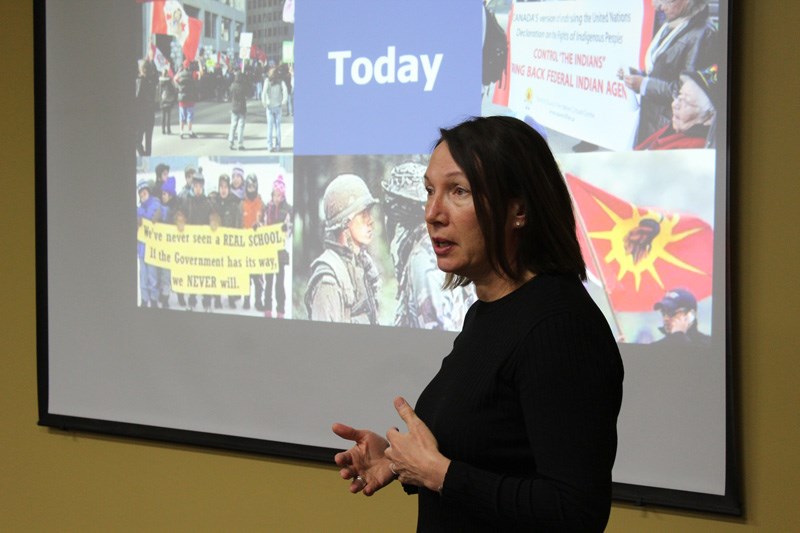While the term “duty to consult” has always carried a lot of excess baggage, Tracy Campbell has dedicated her life to highlighting its inherent value for Aboriginal communities across Canada.
According to Campbell, a citizen of the Métis Nation of Alberta who specializes in Aboriginal consulting for MNP, duty to consult usually comes into play wherever the government or an industry proponent looks to set up a project or change a law that could violate the treaty rights of any Indigenous group.
Thompson is very much entrenched in this complicated legal framework through its symbiotic relationship with Vale inside of Treaty 5 territory. As such, Campbell and a few representatives from MNP set up shop at the Mystery Lake Hotel on Jan. 17 to give city officials a refresher course on how to reconcile these competing interests.
Campbell’s presentation was equal parts legal primer and history lesson, with a particular emphasis being put on how the government is not very good at following its own laws.
For example, while Section 35 of the Constitution Act, 1982 actively recognizes and affirms the treaty rights of Aboriginal peoples, Campbell said federal and provincial governments have done a pretty poor job of doing that very thing.
Whether it was the Oka Crisis in 1990, the Grand River land dispute in 2006, or the Idle No More protests that have been going on since 2012, Campbell said the Canadian government has consistently disregarded the treaty rights of Aboriginal groups in favour of its own self-interests.
“That story has played out numerous times since the early ’90s … whether it’s protests or pipelines or mines or lack of input into approvals or disagreement once approvals have been made,” she said, admitting that the frustration felt by Aboriginal groups is, in some ways, not getting better.
Campbell said a lot of the misunderstandings between Aboriginal and non-Aboriginal people can be traced back to the country’s public school education, which shortchanges a lot of its students by not filling them in on the shadier parts of Canada’s history.
“A lot of Canadians reach the age of 18 and become a voter without being informed about what Aboriginal treaty rights are, which I think is part of the problem.”
Campbell went on to explain that a lot of the original treaties that were signed in the wake of the Royal Proclamation of 1763 were not negotiated in good faith, since what was promised to Aboriginal leaders and what was written down in these documents were two completely different things.
This situation was made worse by the implementation of the Indian Act in 1876, since Campbell said it essentially stripped Aboriginal leaders of their ability to govern themselves and control their own lives.
“Chief and councils needed authority from Indian Affairs, either the Indian agent or the minister, to approve whatever they wanted to do and if the department didn’t like what they were doing they just didn’t let them do it,” she said. “The thought was, if we can socially engineer them into not being Indians anymore, then legally we don’t have to have the treaties anymore.”
Because of all these different factors, Campbell said this dysfunctional relationship between the Canadian government and Aboriginal groups continues to this day, despite the fact that the Constitution was amended to add a section about Indigenous treaty rights back in 1982.
In terms of how this duty to consult process is applied locally, Mayor Dennis Fenske told Campbell at the Jan. 17 meeting that the municipal government is doing its best to consider all these competing interests, especially when it comes to upcoming projects like the development of acreage lots.
“Part of that process is we’ll have to have a discussion with Vale for mining permits, with Nelson House for traditional land use, and the City of Thompson, so that all entities have their concerns raised,” said Fenske.
While Campbell applauds these efforts, she said that provincial governments do not back up municipalities like Thompson through their policies and legislation, since these documents make no mention of the duty to consult process.
However, despite all the cynicism, Campbell does hold out hope for the future.
Not only has the rhetoric surrounding these issues changed for the better under Prime Minister Justin Trudeau, but Campbell also believes that this change of tone has signalled the end of the Indian Act, which would free up a lot of Aboriginal groups to finally take their destiny into their own hands.
Until then, Campbell will continue doing the work she’s been doing for the last 25 years, hoping that countless little victories will result in Aboriginal Peoples having the same degree of health, opportunity, and prosperity as the rest of Canada.
“The impact to treaty and Aboriginal rights is a cumulative thing. So every single disposition, every single approval, every single water withdrawal has another little bite of impact to treaty and Aboriginal rights that will never go away.”




